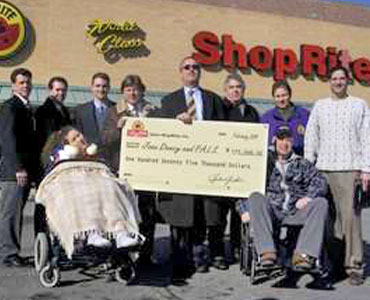![]()
Febuary 8, 2009
By Charles Webster, Staff Writer
“It’s a death sentence.”
That is how Richard J. Saker, president and CEO at Saker ShopRites, describes a diagnosis of ALS (amyotrophic lateral sclerosis), more commonly known as Lou Gehrig’s disease after the Yankees baseball great who died from the disease in 1941.
Saker has seen the fatal effects of the disease, a progressive neuromuscular disorder that has no known cure, as the chairman of the board of trustees at the Joan Dancy and People with ALS (PALS) Support Group.
So, in his role at Saker ShopRites, he handed over a $175,000 donation to the Red Bank-based support group at the ShopRite store on Route 34 in Wall.
The money was raised through various fundraising events throughout the year, including a matching donation program with ShopRite customers who saw every $4 donation for the cause matched by the supermarket.
In the past three years, Saker ShopRites and its customers have donated nearly $800,000 to the support group that focuses on helping families faced with the fatal situation.
“The disease is so brazen. It has a rubber-stamp outcome – three to five years, and it’s usually over,” explained Sean Magovern, president and executive director at the Joan Dancy and the PALS Support Group.
Magovern’s father, Terry Magovern, was the founder of the support group after his fiancee, Joan Dancy, was diagnosed with ALS, told there was no cure and died.
Dancy, a mother of two from Middletown, was diagnosed with ALS in 2001 and died four years later. Terry Magovern fulfilled her dying wish to create the support group, but he, too, died in 2007 of a heart attack.
But Terry’s dream to help ALS patients continues. The Dancy support group does not fund research to find a cure for ALS, but instead focuses its resources on providing a high level of quality-of-life assistance to those with the catastrophic disease.
The needs of patients and their families change dramatically as the disease rapidly progresses. Early on, the family may need help with simple chores around the house, so a housekeeper can be hired to come in once a week. But as the disease ravages the body of the patient, the needs become more acute: wheelchairs, ventilators, medical supplies and a laundry list of specialized and basic items.
“So we adjust what we’re doing for them as the disease progresses,” Magovern explained.
And as the inevitable end draws near, the Dancy support group provides assistance to help the patient maintain whatever quality of life is possible and a level of dignity in dying.
“That’s all you have left at the end, really,” Saker said.


